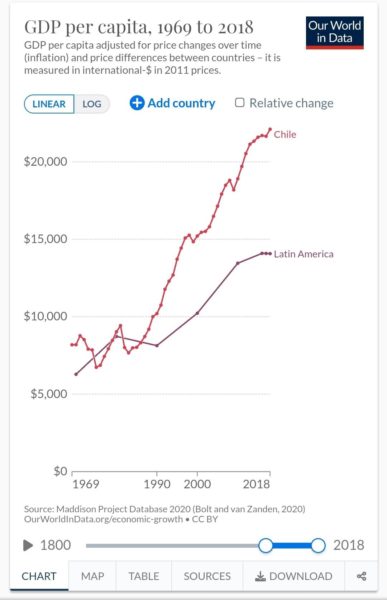There’s an old joke that French libraries file their nation’s constitutions under “Periodicals.” I also recall Walter Berns once telling me the story of a visit he took to South America—it was either Argentina or Chile, I don’t recall which country he specified—where one of his academic hosts dismissed the American Constitution with the comment, “You’ve only had one constitution, while we’ve had lots of them.”
This all came back to mind with regard to the referendum this weekend for a proposed new constitution for Chile, the product of its recently installed socialist government that appears to be losing popularity at a rapid rate.
I didn’t follow the story closely, but understood that the new proposed constitution was nearly 200 pages long, with nearly 400 articles, and about 100 new “rights,” which included the usual lefty goo-goo “rights” to a clean environment, “gender equity,” and so forth. This is the kind “prolix” constitution, typical of recent decades, that John Marshall warned would never be understood by a democratic people.
I didn’t bother to try to find the draft and read it. All I needed to know was that the American left, which remains almost as obsessed with the long-departed Picochet as they are with Trump, was all-in for this nonsensical charter. I saw a pile of articles from the usual lefty outlets about how wonderful the proposed Chilean constitution was.
CNN: “Chile is voting on one of the most progressive constitutions in the world.”
[It is] conceived to fix the country’s stark inequality. The country’s current constitution was written during Augusto Pinochet´s dictatorship and — despite many amendments — most Chileans say it lacks legitimacy and is too free-market oriented. . .
If approved, Chile’s constitution would become one of the most progressive in the world, giving the state a front-line role in the provision of social rights. The draft puts a strong emphasis on indigenous self-determination and on the protection of the environment; the highly privatized water rights system will be dismantled, among other things. Gender equality will be required in all public institutions and companies, and the respect for sexual diversity is also enshrined.
These articles all saved me a lot of time and trouble.
So the Chilean people rejected it in the referendum by a 60-40 margin. Maybe they looked and decided they didn’t want to become Venezuela after all:
Too “free market” indeed.
P.S. The New York Times has a case of the sads over the outcome:


Notice: All comments are subject to moderation. Our comments are intended to be a forum for civil discourse bearing on the subject under discussion. Commenters who stray beyond the bounds of civility or employ what we deem gratuitous vulgarity in a comment — including, but not limited to, “s***,” “f***,” “a*******,” or one of their many variants — will be banned without further notice in the sole discretion of the site moderator.